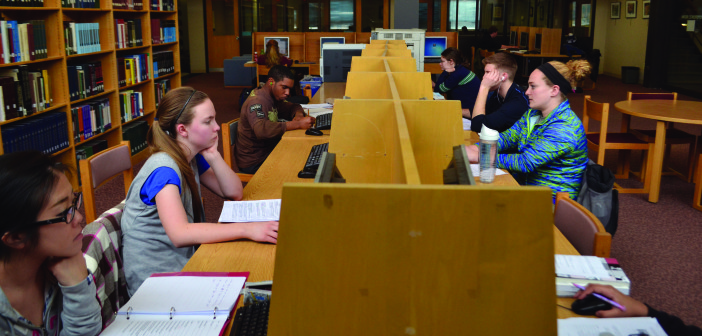David Sutton
Contributing Writer
At the College, winter term is drawing to an end, leaving memories of a term filled with heavy snow, intense cold and class cancellations; even the first day of winter classes was canceled due to weather.
The cancellations affected students who scrambled to make up missed work in an already crammed 10-week term, and professors who had to alter their syllabi multiple times. The term led to the discussion among students and faculty of adding future make-up days or online classes to counter the closings.
The winter weather has left many wondering why the season was so extreme. Wa’faa Shanti, a former intern at WGN with meteorologist Tom Skilling said, “The jet stream is driven by temperature changes over land and the ocean. Over the Alaskan area, there is an omega block, named for its shape like the Greek letter, which keeps the jet stream positioned more north than it originally would be. With this, the general flow of the wind is bringing much colder air down from the poles.”
The decision to close campus isn’t one that’s made lightly by the College’s Crisis Task Force. The task force is comprised of Vice President for student affairs, Kimberly Sluis; assistant vice president for business operations, Mike Hudson; and assistant vice president for marketing and communications, Jim Godo. Other representatives from campus organizations, such as Student Life and Human Resources, are also included.
“We look at what it is that the National Weather Service is saying. What is it the local authorities are saying? We take these sources into strong consideration when making a decision,” said Sluis. “We forward a recommendation to stay open or to close with a summary of the analysis we’ve done and the reasoning behind our decision. So there are tiers in place.”
Sluis continues, “The institution places a strong emphasis on the level of education we wish to provide but we also want to place a strong emphasis on maintaining the safety of the students and staff.”
The extreme wind chills and numerous inches of snow that landed in the beginning of weeks one and four caused class cancellations on two separate Mondays. This affected students in Monday night “jumbos,” the term for four-hour classes that meet only once a week.
Freshman Kayla Gustafson, who has a Wednesday night jumbo, said she would understand if classes were cancelled once but “we learn two chapters a class and if class was cancelled often, it would take away multiple chapters of information and I would be annoyed.”
When asked about student seeking refunds for cancelled classes, Sluis responds that there weren’t any she knew of. “However, we’ve had far more affirmative feedback about our decision to close than any negative critique,” Sluis said. “But you can imagine that a student or faculty member of a Monday night jumbo might have concerns.”
When asked about alternatives, Sluis explains: “There’s conversation on campus about whether we should build in make-up days but when we last looked around at other institutions in our area were not scheduling make-up days due to weather cancellations.”
Another option would be making online courses available during the terms or turning a class into a hybrid class that meets traditionally, or online, in case class cancellations occur.
“I think it’s inevitable that any campus will think about where they fit in the spectrum of online education,” Sluis said. “We’ve chosen institutionally to not dip our toe into that water just yet, but I think there are folks that say we should be thinking about that. It’s unlikely that we are different enough to say we’ll never move classes online. It is possible. We just haven’t made any decisions about moving forward with online classes just yet.”
Will another term of cancellations spark more conversation regarding online class options? Sluis says, “Only time will tell.”

